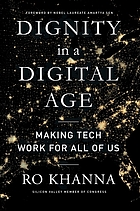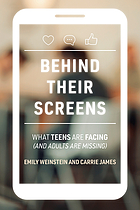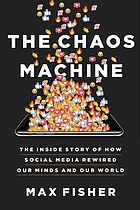Digital Literacy is the set of skills, knowledge, and attitudes that empower us to learn, grow, create, and responsibly engage in the digital world.

-
Digital Literacy is so many things"What is Digital Literacy"? by Vitginia Tech University Libraries
-
Related content: Role of the Metaliterate LearnerHow to become metaliterate.
An OER written by Madison College Libraries exploring Digital Literacy
How libraries support YOU developing digital literacy:
In addition to learning how to mindfully access and critically analyze research information (see HOWLER tutorials), libraries provide access to resources that support your growth and participation in a digital world when you leave school. A few examples:
Information Literacy.
Content Creation.
Information Access & Ethics.
Social Media & Identities.
Related books/ebooks in our collection:
Digital Citizenship in the news
-
Social Media Algorithms and Mental HealthA Stanford psychiatrist’s perspective on social media algorithms and mental health.
-
Online civility improved in past year and is the best it’s been since 2016, new Microsoft research shows...But only for males. "Teen girls and women respondents, on the other hand, reported being both more exposed to online risks and feeling more severe consequences as a result. Females experienced almost 60% of all risks reported in 2021, an all-time high, and were also more likely to have experienced consequences, worry or pain due to being treated uncivilly."
-
Size of Social Network and Online CivilityPeople with larger social networks tend to exhibit greater online civility.
-
The Future of Digital Spaces and Their Role in DemocracyA Pew Research Center Report on the future of Digital Democracy spaces.
-
Social Media Use and Civic EngagementOlder study but still fascinating and relevant.
-
Learning the Landscape of Digital LiteracyPart of the Learning for Justice initiative, a community education program of the Southern Poverty Law Center (SPLC).
Other Outstanding Online Resources
-
All Tech is Human"All Tech Is Human is a non-profit that unites
a diverse range of stakeholders to expand
the overall Responsible Tech ecosystem and
co-create a better tech future." -
Common Sense Education: Digital CitizenshipDigital Citizenship Curriculum categorized by grade and topic.
-
Digitalcitizenship.netThe webpage of Mike Ribble, a well-respected Digital Citizenship in education leader.
-
The Internet and Engaged Citizenship-AMACADA treatise on civic engagement and political participation in a digital world
-
ISTE Digital Citizenship ResourcesInternational Society for Technology in Education (ISTE) provides some outstanding resources for anyone teaching or learning about Digital Citizenship.
-
Metaliteracy.orgInformation Literacy meets Digital Literacy meets Digital Citizenship.
-
Center for Humane Technology"Our mission is to align technology with humanity’s best interests."
Games and Interactivity for Digital Citizenship
-
Newsfeed DefendersA fun and interesting game exploring fake news and disinformation.
-
Datak
 "A serious game about personal data and data protection."
"A serious game about personal data and data protection." -
Interland - Be Internet Awesome
 Google's games teach some elements of Digital Citizenship.
Google's games teach some elements of Digital Citizenship.
Why you should care
We are all interconnected. Digital Technology can both clarify and confuse our purpose and connections as we simultaneously consume and create data and information online.

image by Mark Perkins, 2024
To understand the evolving digital world and our place in it, we must engage information and knowledge mindfully, critically, ethically, and collaboratively.
We need to understand the ways that digital technologies operate and evolve and how we as individuals and societies grow and change along with them.

Civic Engagement
Transform knowledge into informed impact!
Topic Highlight: Civic Engagement.
 Civic Engagement refers to "individual or collective actions designed to identify and address issues of public concern, including individual voluntarism, organizational involvement and advocacy." Digital civic engagement takes this action into our active online spaces.
Civic Engagement refers to "individual or collective actions designed to identify and address issues of public concern, including individual voluntarism, organizational involvement and advocacy." Digital civic engagement takes this action into our active online spaces.
-
Digital Civics Toolkit - "a collection of resources for educators to support youth to explore, recognize, and take seriously the civic potentials of digital life."
- "Civic Engagement in the Digital Age" from Wisconsin's Department of Public Instruction (DPI), Digital Learning Team.
- A Toolkit for Digital Civics from Harvard Graduate School of Education
- Center for Digital Democracy - "CDD strives to safeguard privacy and civil and human rights, as well as to advance equity, fairness, and community."
- The Civic Engagement Research Group (CERG) - from the University of California, Riverside.
“Definition of Civic Engagement” American Psychological Association, www.apa.org/education/undergrad/civic-engagement.
Empowering People through Data Privacy
Why You Should Care
Why you should care
We are all interconnected. Digital Technology can both clarify and confuse our connections as we simultaneously consume and create data and information online.
Digital Citizenship is made up of nine interrelated elements: Digital Access, Digital Commerce, Digital Communication, Digital Literacy, Digital Etiquette, Digital Law, Digital Rights and Responsibilities, Digital Health and Wellness, and Digital Security.
To understand the world and our place in it, we must engage information and knowledge critically and collaboratively.
This includes grasping concepts of privacy, intellectual property, metaliteracy, and civic engagement.






















